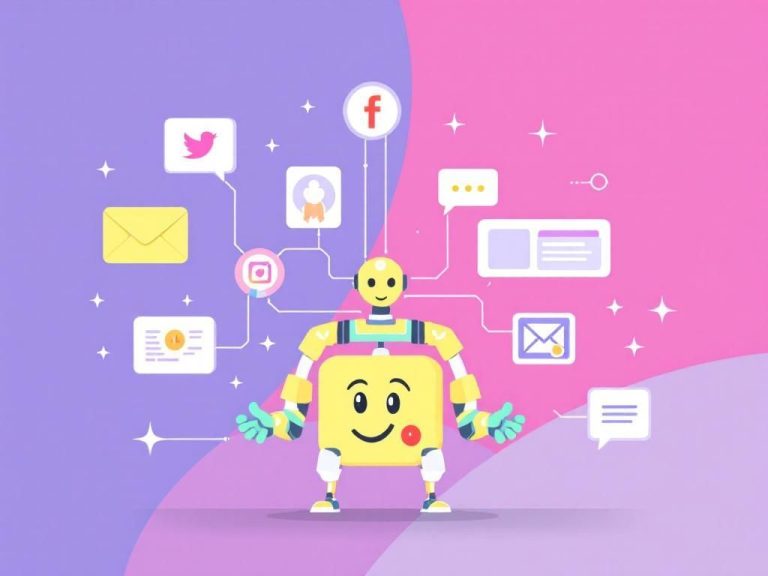The landscape of social media is rapidly evolving, and with it, the challenges that come along with content moderation are becoming increasingly complex. As platforms grow, the volume of user-generated content expands exponentially, leading to issues related to misinformation, harassment, and inappropriate content. In response to these challenges, artificial intelligence (AI) is stepping in with innovative solutions that promise to transform how we approach content moderation. This article will explore the future of social media moderation through AI technologies.
Understanding AI in Content Moderation
Content moderation involves reviewing and managing user-generated content to ensure it aligns with community guidelines and legal standards. In today’s digital age, the sheer volume of content produced daily far exceeds human capacity for moderation. This is where AI comes into play, utilizing natural language processing (NLP), machine learning, and computer vision to analyze and categorize content efficiently.
Key Components of AI Moderation
- Natural Language Processing (NLP): This technology allows AI to understand and interpret human language, enabling it to identify hate speech, harassment, or misinformation within text.
- Machine Learning: AI systems can learn from vast amounts of data, improving their ability to detect problematic content over time through feedback loops and adaptability.
- Computer Vision: For image and video content, AI can recognize visual elements and detect inappropriate imagery, ensuring a safe environment for users.
The Benefits of AI Moderation
AI moderation offers several advantages over traditional human-led moderation, including:
- Scalability: AI can process large volumes of content instantaneously, making it feasible to maintain moderation standards across vast networks of users.
- Consistency: AI algorithms can apply the same standards uniformly, reducing the risk of human bias or inconsistency in decision-making.
- Real-time Analysis: AI can monitor and respond to emerging trends and immediate threats, allowing platforms to act swiftly against harmful content.
- Cost Efficiency: By automating the moderation process, platforms can significantly reduce operational costs associated with human moderators.
Challenges in Implementing AI Moderation
While AI moderation presents numerous benefits, there are also notable challenges that must be addressed:
1. Misinterpretation of Context
AI systems may struggle to understand the context in which certain phrases or images are used, potentially leading to false positives or negatives.
2. Ethical Implications
The use of AI raises ethical concerns regarding free speech, bias in algorithmic decisions, and transparency in moderation processes.
3. Evolving Nature of Language
Language is dynamic, with slang and cultural references constantly changing. AI must be regularly updated to keep pace with these changes to remain effective.
Future Trends in AI Moderation
As we look ahead to 2025 and beyond, several trends are likely to shape the future of AI moderation in social media:
1. Enhanced Collaboration Between AI and Human Moderators
While AI excels at processing large amounts of data, human moderators can provide the nuanced understanding necessary for complex cases. A hybrid approach that combines both will likely become the standard.
2. Improved Algorithms for Contextual Understanding
Ongoing research in NLP and machine learning will lead to more sophisticated algorithms that better understand context, sentiment, and intent behind user-generated content.
3. Greater Transparency and User Control
Future moderation systems may offer users more insight into how content decisions are made, including explanations for moderation actions taken on their posts.
4. Focus on Mental Health and Well-being
As awareness of online harassment and its effects on mental health grows, AI moderation tools may prioritize the identification and mitigation of harmful behavior, creating a safer online environment.
Case Studies: Successful AI Moderation in Action
| Platform | AI Tool | Outcome |
|---|---|---|
| DeepText | Improved detection of hate speech by 80% | |
| Moderation Bots | Reduction in abusive tweets by 30% | |
| YouTube | Content ID | Successful flagging of copyrighted content and harmful videos |
Conclusion: Embracing the Future of Moderation
The integration of AI in social media content moderation presents an unprecedented opportunity to create safer, more inclusive online spaces. While challenges remain, the advancements in technology and the commitment to ethical standards will be paramount to ensuring that moderation systems serve the community effectively. As we move closer to 2025, embracing AI as a tool for positive change in social media is essential for fostering healthy digital interactions.
FAQ
What is AI moderation in social media?
AI moderation refers to the use of artificial intelligence technologies to monitor, review, and manage user-generated content on social media platforms, ensuring compliance with community guidelines and reducing harmful content.
How does AI improve social media moderation?
AI improves social media moderation by quickly analyzing vast amounts of content, identifying inappropriate or harmful posts, and automating the moderation process, which enhances efficiency and accuracy.
What are the benefits of using AI for social media moderation?
The benefits of using AI for social media moderation include faster response times, reduced human error, consistent enforcement of guidelines, and the ability to scale moderation efforts to handle large volumes of content.
Will AI replace human moderators in social media?
While AI can significantly assist in content moderation, human moderators will still be essential for complex cases that require nuanced understanding and context, ensuring a balanced approach.
What challenges does AI face in social media moderation?
AI faces challenges in social media moderation such as understanding context, detecting sarcasm, and addressing biases in algorithms, which can lead to misinterpretation of content.
How will AI moderation evolve in social media by 2025?
By 2025, AI moderation is expected to become more sophisticated, integrating advanced machine learning techniques, improving contextual understanding, and enhancing user privacy measures in the moderation process.




